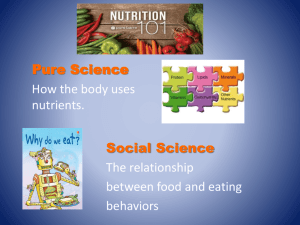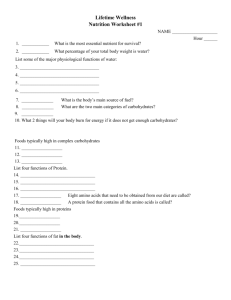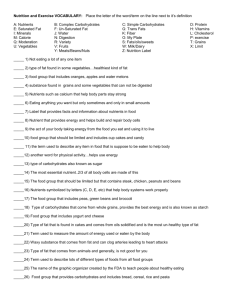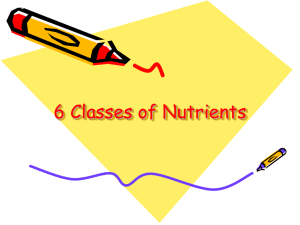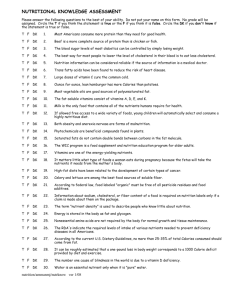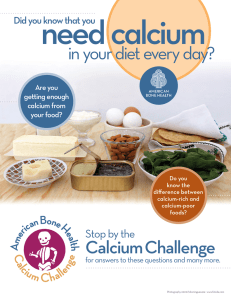Complex Carbohydrates are nutritionally dense
advertisement
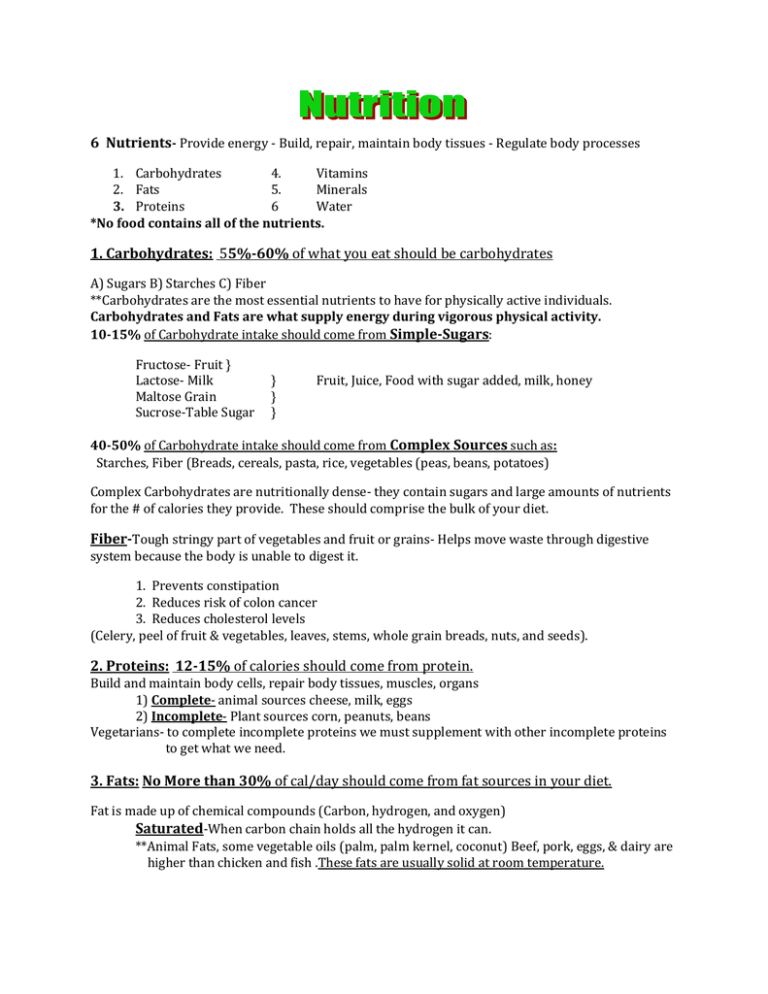
6 Nutrients- Provide energy - Build, repair, maintain body tissues - Regulate body processes 1. Carbohydrates 4. Vitamins 2. Fats 5. Minerals 3. Proteins 6 Water *No food contains all of the nutrients. 1. Carbohydrates: 55%-60% of what you eat should be carbohydrates A) Sugars B) Starches C) Fiber **Carbohydrates are the most essential nutrients to have for physically active individuals. Carbohydrates and Fats are what supply energy during vigorous physical activity. 10-15% of Carbohydrate intake should come from Simple-Sugars: Fructose- Fruit } Lactose- Milk Maltose Grain Sucrose-Table Sugar } } } Fruit, Juice, Food with sugar added, milk, honey 40-50% of Carbohydrate intake should come from Complex Sources such as: Starches, Fiber (Breads, cereals, pasta, rice, vegetables (peas, beans, potatoes) Complex Carbohydrates are nutritionally dense- they contain sugars and large amounts of nutrients for the # of calories they provide. These should comprise the bulk of your diet. Fiber-Tough stringy part of vegetables and fruit or grains- Helps move waste through digestive system because the body is unable to digest it. 1. Prevents constipation 2. Reduces risk of colon cancer 3. Reduces cholesterol levels (Celery, peel of fruit & vegetables, leaves, stems, whole grain breads, nuts, and seeds). 2. Proteins: 12-15% of calories should come from protein. Build and maintain body cells, repair body tissues, muscles, organs 1) Complete- animal sources cheese, milk, eggs 2) Incomplete- Plant sources corn, peanuts, beans Vegetarians- to complete incomplete proteins we must supplement with other incomplete proteins to get what we need. 3. Fats: No More than 30% of cal/day should come from fat sources in your diet. Fat is made up of chemical compounds (Carbon, hydrogen, and oxygen) Saturated-When carbon chain holds all the hydrogen it can. **Animal Fats, some vegetable oils (palm, palm kernel, coconut) Beef, pork, eggs, & dairy are higher than chicken and fish .These fats are usually solid at room temperature. Unsaturated-Liquids or oils at room temperature (Vegetable oils) **FAT 1) Stores energy 2) Carries fat soluble vitamins into blood A, D, E, K 3) Helps keep body healthy, growth and repair of cells 4. Vitamins are classified as "fat-soluble" or "water-soluble." Fat soluble vitamins, which include A, D, E, and K, should be taken at recommended levels to prevent adverse side effects that can occur with taking too much. Water soluble vitamins include B-complex vitamins and vitamin C. Excessive amounts B & C vitamins can be excreted in the urine so adverse side effects are less common when taking water soluble vitamins. 5. Minerals are nutrients that help regulate cell activities. Twenty-five minerals are needed for proper bodily function. Two common minerals that people often supplement are calcium and iron. Iron -is a nutrient that the body needs to help build red blood cells. Foods rich in iron include meat, liver, peas, beans, spinach, whole grains, and eggs. Too much iron in the body, a condition called iron overload, can cause serious problems, including liver damage. Calcium - helps you develop strong bones and teeth, and facilitates muscle contractions. Most individuals do not consume adequate calcium. Despite recommendations for female and male high school students of 1300 mg/day, most students consume only 600 to 800 mg/day. Good sources of calcium include yogurt, skim milk, low-fat cheese, and calcium fortified orange juice, tofu, or soy milk. Green leafy vegetables such as broccoli or spinach also provide calcium. • When taking calcium, it is important to avoid drinking caffeinated beverages and soda pop because they can interfere with calcium absorption. 6. Water has many important functions including transporting nutrients to your cells, riding your body of wastes, and regulating body temperature. Your body loses 2 - 3 quarts of water a day through breathing, sweating, and eliminating waste. If you take your body weight, divide it in half… that is how many ounces of water you should drink in a day for optimal health. Food Pyramid provides guidelines for proper daily eating. Go to http://www.mypyramid.gov/ to do your analysis under “My Pyramid Plan”. How Many Calories Should You Eat in a Day? --most Labels are based on 2000-2500 Calorie/day Diet. • • • 1600 calories: primarily sedentary women. 2200 calories: most children, teenage girls, active women, sedentary men. 2800 calories: usually teenage boys, active men, and very active women. How much Fat should I eat? ---- Limit the amount of Saturated fat in your diet! 1,600 calorie diet - Limit fat to 53 grams 2,200 calorie diet - Limit fat to 73 grams 2,800 calorie diet - Limit fat to 93 grams
